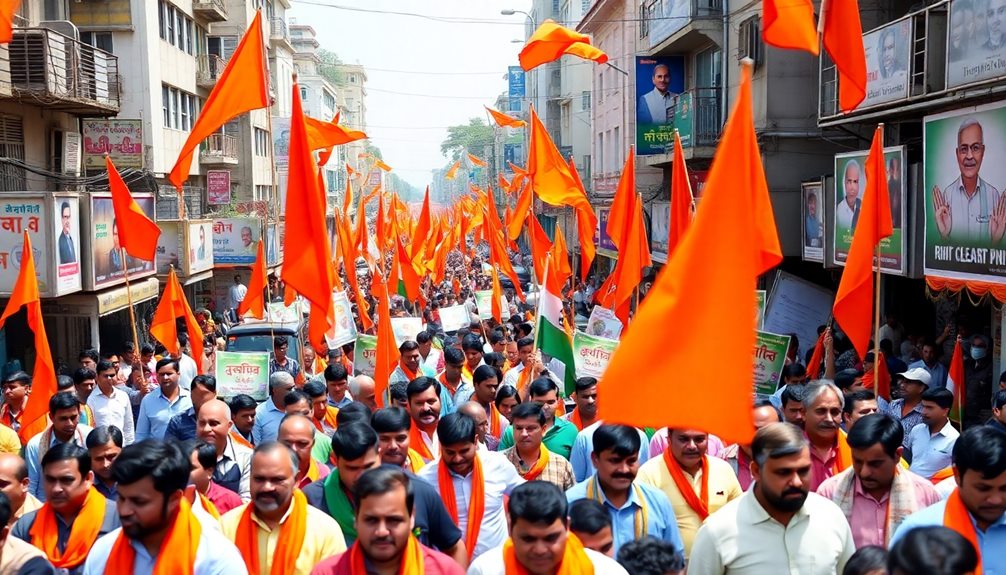Shiv Sena, founded in 1966, has been a key player in regionalist politics in India, primarily advocating for Maharashtrian pride. Over the years, it shifted towards a right-wing Hindu nationalist stance, notably during the 1980s. The party's influence surged after its alliance with the BJP in the mid-1990s, but internal divisions have weakened its unity since 2022. You'll notice varying ideological views within leadership, with factions emerging under Uddhav Thackeray and Eknath Shinde. Shiv Sena's policies have sparked protests and debates, reflecting its complex role in India's political arena. There's more to uncover about its evolving dynamics.
Key Takeaways
- Shiv Sena, founded in 1966, has evolved from promoting regional pride to becoming a significant right-wing Hindu nationalist party in India.
- The party's anti-immigrant stance historically targeted South Indians and Gujaratis, reflecting its regionalist sentiments.
- Ideological divisions emerged post-2022 split, with Uddhav Thackeray's faction favoring secularism while Eknath Shinde's faction leans towards Hindutva.
- Shiv Sena's alliance with the BJP in the mid-1990s significantly increased its political influence in Maharashtra.
- Ongoing internal strife and legal disputes challenge the party's identity and leadership legitimacy, impacting its future prospects.
Introduction

Understanding the evolution of Shiv Sena offers insight into the complexities of regional politics in India. Founded by Bal Thackeray in 1966, Shiv Sena initially aimed to promote Maharashtrian pride and tackle perceived threats from migrant workers in Mumbai.
Over the years, it transformed into a right-wing Hindu nationalist political party, riding the wave of rising Hindu nationalism during the 1980s. This shift marked its engagement in communal politics, which resonated with many in Maharashtra.
Shiv Sena's political strategy paid off; it gained considerable traction, winning 42 out of 140 seats in the 1968 Municipal Corporation elections. The party's anti-immigrant sentiment particularly targeted South Indians and Gujaratis while advocating Hindutva as a unifying ideology.
However, internal divisions that emerged in 2022 presented challenges. Factions arose, with the Eknath Shinde-led faction recognized as the legitimate party, while Uddhav Thackeray's faction leaned towards a more secular and progressive approach.
These internal divisions highlight the ongoing struggles within Shiv Sena and reflect larger trends in regional politics, illustrating how regional parties can evolve and fragment in response to changing socio-political landscapes.
Background
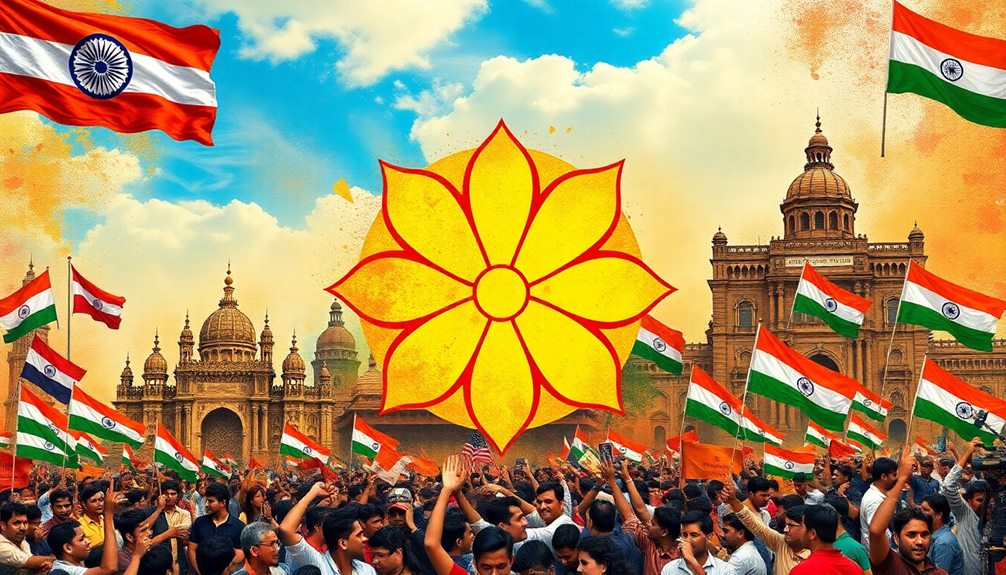
The Shiv Sena's origins can be traced back to the socio-economic landscape of Maharashtra in the 1960s, where local residents felt increasingly threatened by an influx of migrant workers. Founded on June 19, 1966, by Bal Thackeray, the party aimed to promote Maharashtrian identity and regional pride. This focus led to significant political traction, winning 42 out of 140 seats in the 1968 Municipal Corporation elections.
Over the years, Shiv Sena transformed into a right-wing regionalist party, adopting anti-Muslim and anti-communist sentiments. Its rhetoric aligned closely with the rising wave of Hindu nationalism, particularly in the 1980s.
By the mid-1990s, the party reached its peak, forming a government in Maharashtra through an alliance with the BJP. A notable achievement during this period was the renaming of Bombay to Mumbai, a move reflecting its regionalist agenda.
However, internal divisions plagued the party, culminating in a split in 2022. Following Eknath Shinde's revolt against Uddhav Thackeray, two main factions emerged: Balasahebanchi Shiv Sena and Shiv Sena (UBT), each claiming legitimacy and showcasing differing ideologies.
Leadership and Key Figures
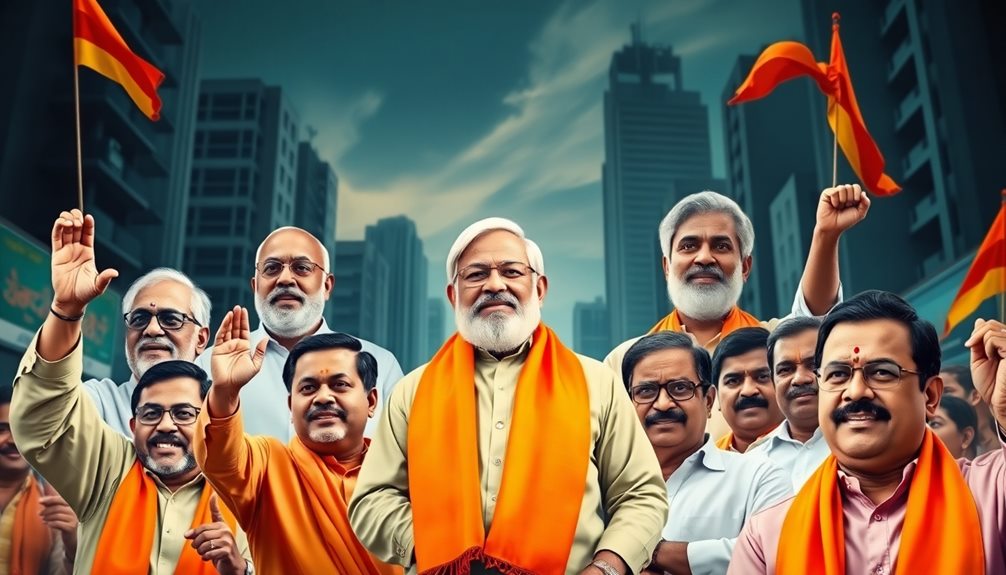
Shiv Sena's leadership has seen significant shifts, particularly in recent years as internal conflicts have come to the forefront. Bal Thackeray, the party's founder, established its identity in 1966, emphasizing Maharashtrian pride and a strong stance against perceived threats.
After his passing, Uddhav Thackeray took over in 2004 and navigated the party through pivotal changes, including alliances with the BJP and the formation of the Maha Vikas Aghadi coalition.
However, in 2022, Eknath Shinde emerged as a key figure, leading a revolt against Uddhav and creating a faction that retained the original Shiv Sena's name and symbol. This split highlighted the ideological divisions within the party, with Uddhav's faction leaning towards secularism while Shinde's faction clings to conservative Hindutva roots.
Amidst these tensions, Aditya Thackeray, Uddhav's son, has positioned himself as a prominent young leader within Shiv Sena (UBT), advocating for progressive policies while still respecting the party's core values.
The ongoing leadership struggle showcases the complex dynamics and varying visions for Shiv Sena's future, making it a critical focal point in Indian politics today.
Protests Against Party Policies
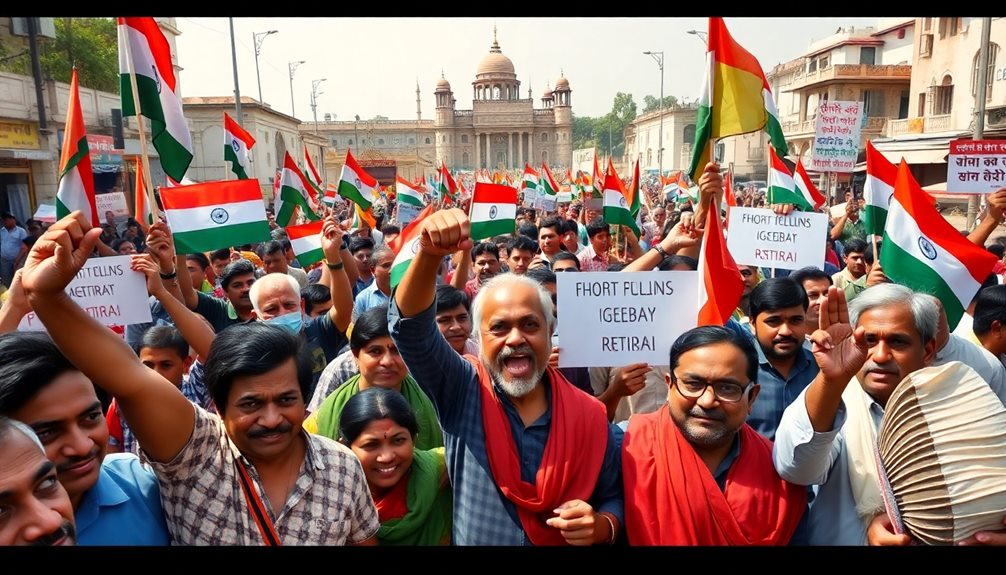
Protests against Shiv Sena's policies often erupt in response to its perceived anti-immigrant stance, particularly targeting South Indians and Gujaratis. Many individuals label these policies as discriminatory, prompting public demonstrations aimed at advocating for inclusivity and equality.
The party's controversial history, marked by its involvement in communal riots after the Babri Masjid demolition, has only intensified calls for accountability.
In 2022, internal divisions within Shiv Sena led to further protests. Members rallied against Eknath Shinde's revolt against Uddhav Thackeray, showcasing dissent over leadership and the party's ideological direction. Such unrest highlights the growing frustration among supporters who feel disconnected from Shiv Sena's evolving policies.
Additionally, the party's alliance with the BJP has drawn criticism. Leftist and secular groups view this partnership as a betrayal of Shiv Sena's original regionalist and secular values, sparking protests that demand a return to those core principles.
Job seekers have also voiced their concerns over local employment policies, with many claiming favoritism towards Marathi speakers, which exacerbates tensions and fuels ongoing protests.
Political Affiliations Affecting Careers
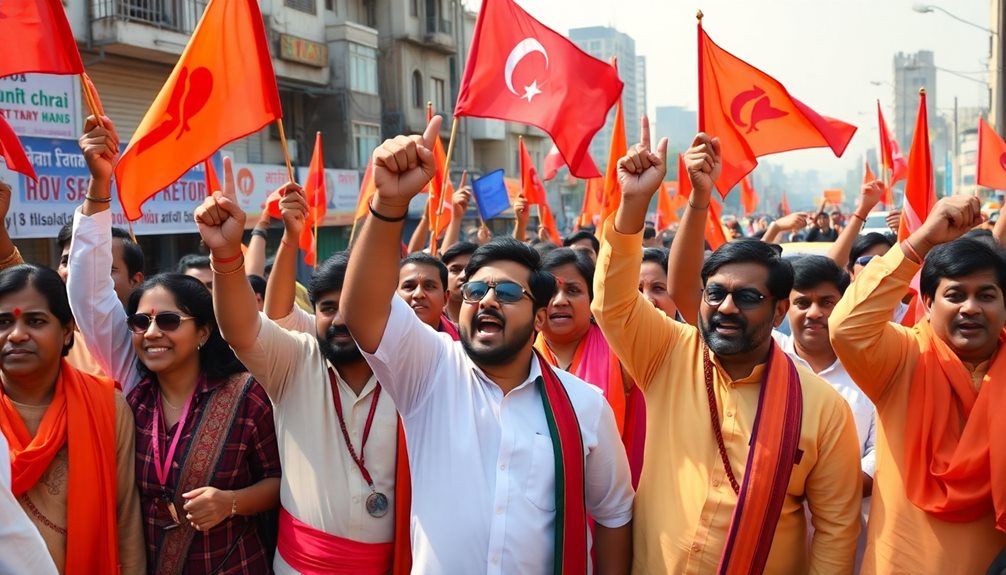
Navigating the political landscape in Maharashtra can be tricky for those involved with Shiv Sena, especially given the party's shifting alliances and internal strife. Your political affiliations can significantly shape your career trajectory within this party.
For instance, the alliance with the BJP during the 1995 elections helped elevate Shiv Sena's influence, impacting candidate selection and electoral strategies. However, internal divisions, particularly the 2022 split, have left many members uncertain about their futures.
Key figures like Eknath Shinde and Uddhav Thackeray emerged as leaders of opposing factions, complicating the situation further. If you align yourself with the party's right-wing, Hindu nationalist ideology, you might find support among local voters who resonate with anti-immigrant sentiments and a strong Marathi identity.
But be aware that adopting such hardline stances comes with its risks, especially in light of ongoing legal disputes regarding party identity and leadership legitimacy.
Ultimately, your political career within Shiv Sena hinges on navigating these alliances and internal divisions effectively. The landscape is ever-changing, and adaptability may be your greatest asset in this volatile environment.
Frequently Asked Questions
What Are the Main Ideologies of Shiv Sena?
You'll find that Shiv Sena primarily promotes Marathi nationalism, Hindutva, and regional pride. It emphasizes the rights of local residents, advocates for cultural preservation, and supports economic development tailored for the Maharashtra state and its people.
How Does Shiv Sena Influence Local Governance?
Shiv Sena influences local governance by promoting regional interests, shaping policies, and mobilizing support. You'll notice their impact in decision-making processes, local elections, and community initiatives that prioritize Marathi culture and welfare over broader national agendas.
What Role Does Social Media Play in Shiv Sena's Outreach?
Social media amplifies your outreach, letting you connect with a broader audience. You can share messages, engage supporters, and mobilize public opinion quickly, making it a powerful tool in shaping perceptions and driving political engagement.
How Does Shiv Sena Engage With Youth Voters?
To engage youth voters, you'll notice Shiv Sena uses social media campaigns, organizes youth-centric events, and addresses issues that resonate with younger generations. They're focused on creating a relatable image and fostering active participation.
What Are the Party's Plans for Future Elections?
You'll see the party focusing on grassroots outreach, leveraging social media, and addressing youth concerns. They're likely to refine their policies, ensuring they resonate with voters' aspirations for a better future in upcoming elections.

